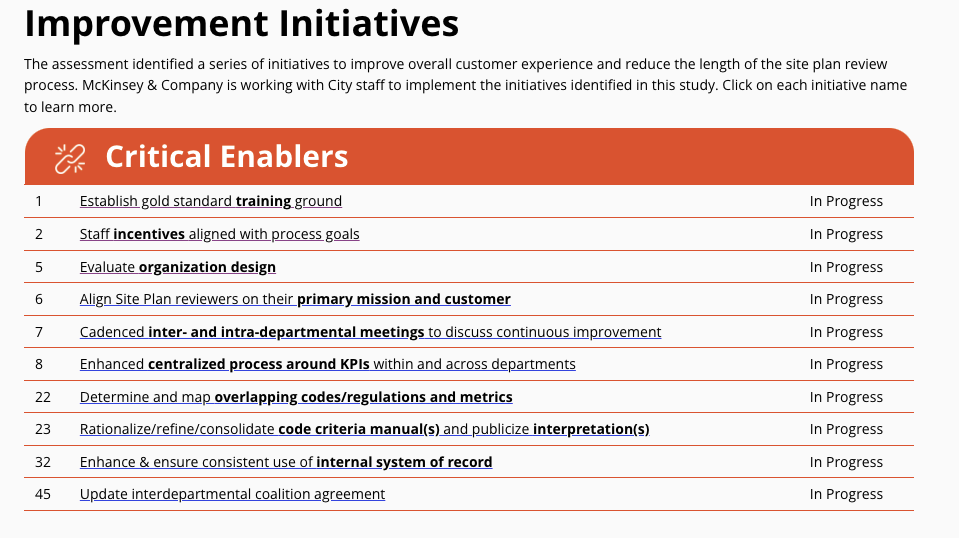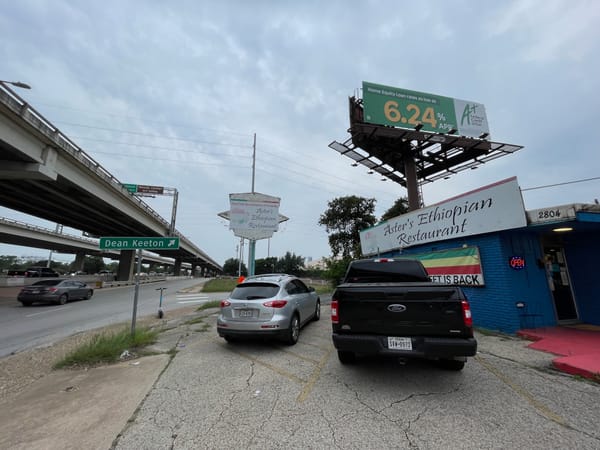A look back at Watson's first year
The mayor takes credit for a lot. How much of it is deserved?

Yesterday Mayor Kirk Watson sent out a Watson Wire reflecting on his first year back in office after a 22-year hiatus from city government. In a characteristically folksy tone, the mayor lists the ways in which he has fulfilled his pledge to "shake up City Hall."
It begins with Watson's greatest political achievement: Jesus Garza.
The year started with a few big things that proved the need for a different approach and a shakeup.
We faced a winter storm that revealed how badly our emergency management was out of alignment. Quickly and decisively, we replaced the City Manager and brought in Jesús Garza as the interim City Manager. And he, in turn, brought in a team dedicated to professionalism, common sense, and success. They’ve accepted the challenges and made changes needed to get us through a demanding year. I truly thank Jesús and his team, including all the public employees that work every day to make Austin special.
Now, we have new leaders at the Homeland Security & Emergency Management Department as well as Austin Energy. We’ve made numerous and significant changes in operations in those services this year.
Watson couldn't have asked for a better political gift than Winter Storm Mara. Sure, there were a few moments of embarrassment, where he apologized for not being more communicative with the public about the disaster, but it provided him an opportunity to install a loyalist as city manager.
Garza, who was city manager during Watson's last stint as mayor at the turn of the century, had most recently served as the treasurer of the political action committee that spent roughly $1 million on behalf of Watson's mayoral candidacy, including on misleading attack ads against his opponent, Celia Israel.
You'd think that some Council members, many of whom bristled at the notion of Watson as a returning savior, would have hesitated to appoint one of his pals to the most powerful position at City Hall. And yet, they all went along with it, reasoning that there weren't many other people around with the experience to hit the ground running.
Formally, the mayor of Austin is nothing more than a glorified Council member. However, with his longtime ally in charge of the city bureaucracy, Watson enjoys significant informal power that his colleagues on the dais lack. It was telling, for instance, that Watson was the only Council member who didn't offer any amendments to the budget authored by Garza. Presumably his input was already incorporated.
Watson also touts his efforts on housing.
For almost a decade, City Hall was stuck when it came to reform that can provide more needed housing for Austin. That changed in 2023. We’re tackling the issues that have made it hard to create housing in Austin and focused on necessary land-use changes to encourage more housing, particularly along our transit corridors. And we did it by being open and giving notice to people about what was going on.
I understand that efforts like the HOME initiative have detractors. I get it. That’s one of the reasons I offered an amendment (adopted unanimously) to collect data on how it really works. We need practical information and not just theory to judge outcomes and calibrate when needed.
His telling of the story is a bit unfair to his predecessors, but Watson has certainly exceeded expectations on zoning reform. Maybe it's because he simply knows it's the right thing to do or maybe it's because he recognized that it's good politics, but he has gone along with every pro-housing zoning reform thus far. He hasn't been the driving force behind them, but nor has he gotten in the way, which one might have expected him to do based on his 2022 campaign.
My question: Is there any reason to believe that Watson, who campaigned as a land use moderate, has done more for land use reform than Celia Israel would have? My sense is no –– the election of pro-housing candidates in Districts 9 and 5 (Zo Qadri & Ryan Alter) would have resulted in the same policy outcomes.
But who knows? Is it possible that Watson, who campaigned for NIMBY votes but has since supported every YIMBY reform, has made it easier for his close ally Leslie Pool to complete her evolution from preservationist to urbanist icon? Maybe. If that's the case, it's no small feat, since, in light of recent court rulings, having nine pro-reform votes (3/4 majority) is a lot better than having eight.
On permitting...
We also have new leadership at the Development Services Department, which pretty much everyone said was fundamentally broken. As promised in the campaign, we brought in a third party (McKinsey Consulting) to do a performance review. That review is complete and being implemented, resulting in significant positive outcomes already. Overall, site plan turnaround times are better today than they have been in the last six years. A lot of folks who complained loudly about that broken city function have slowly begun to change their tune.
Huh. That's not what I'm hearing from people in the industry. And the "significant positive outcomes" just links to a list of initiatives recommended by McKinsey, all of which are "in progress." For instance:

Now on to public safety. Here's what Watson says:
We started the year with real problems in our 911 emergency response. We’ve greatly improved 911 staffing so that, in the last half of November, operators answered 93% of calls within 15 seconds. That’s a big change just since July, when 69% were answered in 15 seconds. Since January of 2023, we’ve hired 85 new employees and the training team has conducted more than 25,000 hours of new employee training.
The increased staffing at the 911 center, where things had become dire, is crucial. No doubt about that. Some of the changes that facilitated the increased staffing came before Watson, notably the big pay increase Council approved in 2022. But Jesus Garza and his deputies, including public safety czar Bruce Mills, have been much more aggressive in getting this kind of stuff done than their predecessors.
Both the EMS and Firefighters unions have new contracts that were completed this year. EMS vacancies have been significantly reduced in 2023 as a result of new recruiting efforts and the labor contract approval.
Well, the EMS vacancy rate has dropped from 20% to 16%. "Significantly reduced" is a bit of an overstatement, but at least the new hires exceed the departures.
Now, on to the cops:
In March, the Council passed an ordinance to assure our police officers’ salaries and benefits even in the absence of a long-term contract. I’ve committed to passing an updated version of the ordinance early in ’24.
If your goal is to maximize police staffing, then assuring the cops of pay raises without forcing them to negotiate a new contract is a victory. But this completely undercuts the city's leverage in negotiating for increased police oversight. But frankly, it doesn't seem like anybody on Council is committed to fighting for police oversight.
Speaking of police accountability...
We tried to increase needed patrols by partnering with the Texas Dept. of Public Safety. While aspects of the partnership were helpful, it didn’t work the way I had hoped it would and we ended it. But I’ll always have a bias for action, and if something doesn’t work exactly as I hoped, I’ll learn from it and move on. In my view, that’s leading. In something as complicated as city government, we have to live and learn and keep trying so we can actually begin to move forward with a smoother ride.
On homelessness...
The City’s program for addressing those living homeless was badly out of sorts. This year, we created a stand-alone Homeless Strategy Office to better manage these complicated services. We’ve also opened successful new shelters, including the Marshalling Yard, which has 300 new beds and wasn’t being used at all when we started the year. Just last month, the city’s new Eighth Street Shelter started welcoming unhoused women and transgender neighbors, replacing the Salvation Army facility that the non-profit surprisingly shuttered. This will give us another 150 needed shelter beds.
The jury is still out on the Marshalling Yard. It's true that emergency shelter has to be part of the solution to homelessness, but time will tell whether this facility is a good bang for our buck.
One thing I'll definitely give Watson credit for is getting $65 million in federal funds administered by the Texas Department of Housing and Community Affairs for homelessness housing. That was definitely good!
Relatedly, Watson deserves credit for putting pressure on Central Health, the public hospital district that he helped establish two decades ago, to dip into its substantial reserves to prevent devastating cuts at Integral Care, the local mental health safety net provider.
This line was weird (emphasis mine):
The so-called Zilker Park Vision Plan was badly dividing Austin and was set up to damage that jewel. We stopped that.
Plenty of Watson's own supporters must have rolled their eyes there.
What about I-35?
The mayor spent years as a state senator pushing for the expansion of I-35, and now that it's moving forward, he barely mentions it. Wonder why that is?
Poised for reelection
Perhaps the most significant Watson accomplishment is that he has yet to draw an opponent as he gears up for reelection this November.
It's an open secret that Kathie Tovo is planning to run, but she's a heavy underdog. Because Watson has done the right thing on land use, I expect Tovo to have a harder time raising money and putting together an electoral coalition than Celia Israel, who came within 1,000 votes of beating him. The YIMBYs who supported Israel over Watson will of course support Watson over Tovo, their longtime archenemy.
Watson certainly has some vulnerabilities on his left flank (criminal justice, I-35 expansion, coziness with Republicans, being a Boomer white guy) but Tovo, a staid neighborhood liberal, is not ideally-positioned to exploit them.
To get daily insight about the politics and policy shaping your city, please subscribe to the Austin Politics Newsletter.





